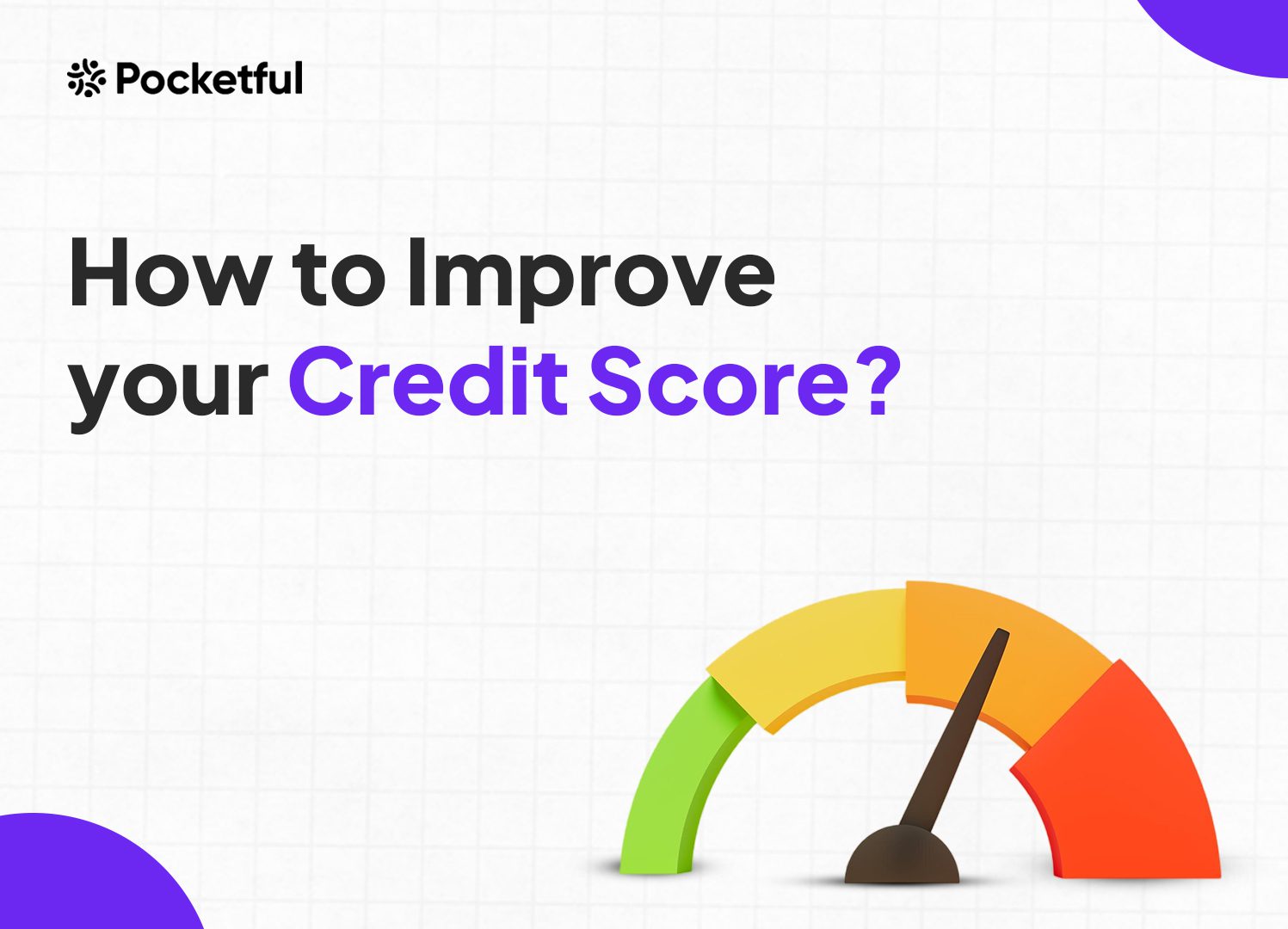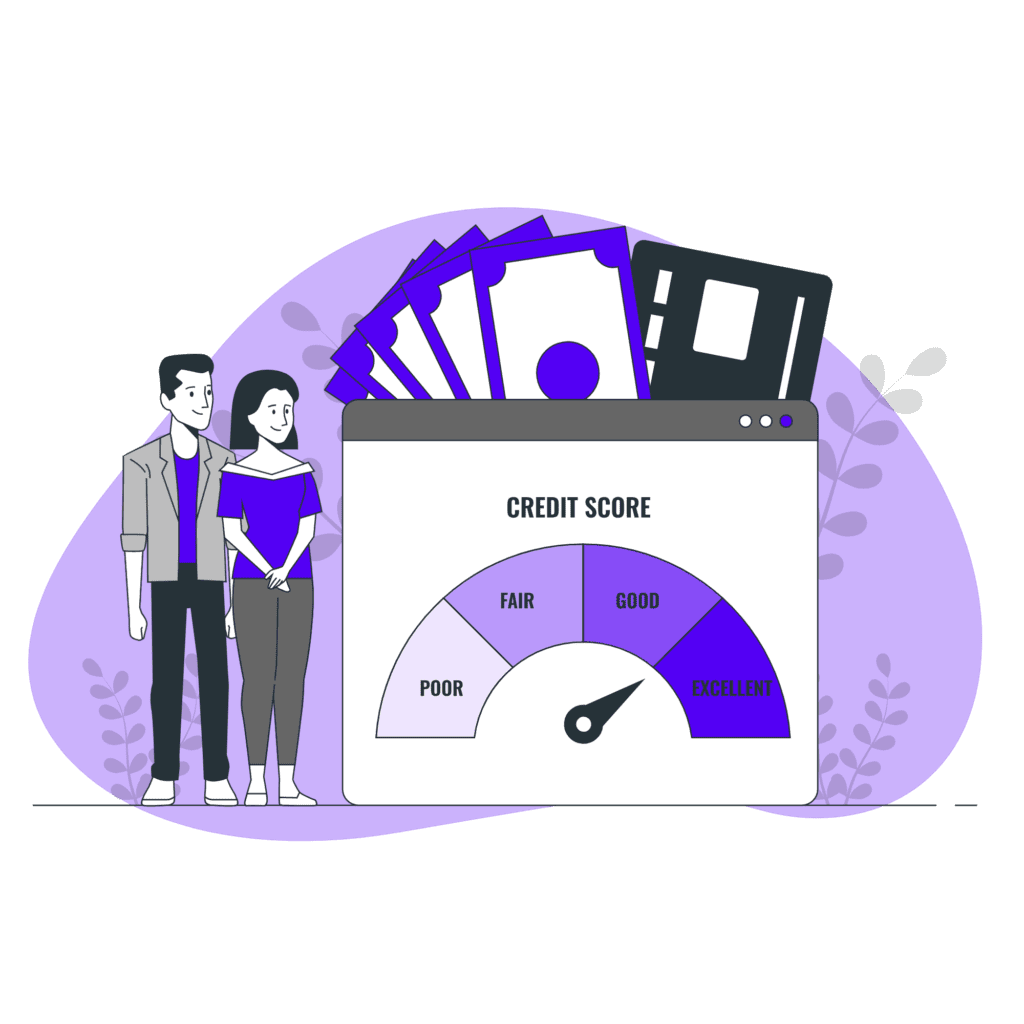| Type | Description | Contributor | Date |
|---|---|---|---|
| Post created | Pocketful Team | May-31-24 |

- Blog
- how to improve your credit score
How to Improve Your Credit Score?

Have you ever been denied a loan because of your credit score? Or are you someone whose credit score is below 700? A bad credit score can hold you back from reaching your financial goals. But the good news is, you can take control and improve it!
In today’s blog, we will tell you the secrets to boost your credit score and uncover a world of financial opportunities.
Credit Score – An Overview

A credit score is a numerical indicator that reflects how likely you are to repay a loan on time (individual creditworthiness). It is based on your credit history, bill payments, current debt, and how long you’ve had credit accounts open. Lenders use credit scores to decide whether to approve your requests for loans and credit cards and what interest rates you will be charged. In general, the higher your credit score, the better your creditworthiness.
Credit Information Companies (CICs)
In India, credit scores are provided by credit information companies (CICs) licensed and regulated by the Reserve Bank of India (RBI). These CCIs collect and maintain credit information from several lenders and generate your credit report and score.
Below mentioned are the four major Credit Information Companies in India.
- TransUnion CIBIL – it is the most prominent CIC in India and maintains the widely used CIBIL score. It was formerly known as the Credit Information Bureau. The company provides services to MSMEs, corporate, individual, and financial clients. It also serves banks, financial institutions, non-bank financial businesses (NBFCs), home finance companies, microfinance companies, and insurance companies in India.
- Experian Credit – this is another major credit information company operating in India. It entered India in 2006 as a joint venture with Federal Bank, Punjab National Bank, Axis Bank, Magna Finance, and Union Bank of India. Experian Credit provides nationwide coverage with a database of more than 430 million loan records and has signed up more than 5,000 banking and financial organizations nationwide as members.
- Equifax – Equifax is a major player in the world of credit information and is considered one of the ‘Big Three’ credit bureaus alongside Experian and TransUnion. They collect and analyse data on consumers and businesses, providing credit reports, analytics and other credit-related information to several companies. Retailers, utilities, government agencies, financial institutions, and other businesses are among the many industries they target with their solutions.
- CRIF High Mark – CRIF High Mark is India’s leading credit information company, licensed and regulated by the Reserve Bank of India. It provides credit information, analytics, and scoring solutions to many clients, including banks, NBFCs, insurance companies, and more.
Factors that Affect Credit Score

Read Also: Best Credit Cards in India: Factors and Features Explained
Numerous factors affect the credit score of individuals; some of them are:
- Credit Utilization Ratio: This compares your credit card balances to your total credit limits. It is the ratio of used credit to the total credit available. A lower ratio (~below 30%) is considered good.
- Payment History: This is the most impactful factor on your credit score. It reflects how timely you have made past payments on loans and credit cards. A consistent history of on-time payments is important.
- Credit Mix: This refers to your various credit accounts, such as credit cards, mortgages, or instalment loans. Having a healthy mix demonstrates responsible credit management.
- Length of credit history: The longer your credit history, the better it shows lenders you have a track record of managing credit over time.
Additionally, internal credit models are statistical models developed and used by lenders. These models analyse borrower data to assess creditworthiness and predict the likelihood of loan repayment.
Lenders collect data on their borrowers, such as loan history, demographics, income, and other alternative data sources. Statistical techniques, such as logistic regression, discriminant analysis, survival analysis, etc., are used to analyse the data and predict defaults.
While statistical methods remain important, the credit scoring landscape is evolving. Machine learning algorithms, particularly random forests, gradient boosting, and deep neural networks, are increasingly used to predict default rates. Therefore, it is essential to maintain a healthy outlook across all possible factors to have a good credit score.
How to Boost Your Credit Score?

There are several techniques you can implement to improve your credit score.
- Pay your bills on time, as this is the single most important factor in your credit score. Late payments can seriously damage your score. You can set up auto payments or reminders to help you track your bills.
- Keep your credit card under-utilised. Ideally, you should aim to keep your credit utilization ratio below 30%. This shows that you are staying within your credit limit and that you can manage your credit responsibly.
- Review your credit report regularly for errors because mistakes on your credit report can bring your score down. You can get a free credit report from the three major credit bureaus. If you find any errors, be sure to dispute them with the credit bureau.
- Do not apply for too much credit at once. Whenever you apply for credit, a hard inquiry is placed on your credit report. These inquiries can affect your score for a short period. So, avoid applying for multiple credit cards or loans in a short period.
- A secured credit card can be a good way to start building credit if you have bad credit or no credit history. With a secured credit card, you make a deposit that becomes your credit limit. Your credit score will improve as you use the card and make your payments on time.
Read Also: Understanding the Difference Between Credit and Debt
Conclusion
Credit scores are a numerical representation of your creditworthiness, and building a good credit score takes time and effort, but the rewards are significant. Not only will you qualify for better interest rates, but you will also establish yourself as a reliable borrower. Understanding how credit scores are evaluated and their influencing factors is vital for your financial well-being.
Frequently Asked Questions (FAQs)
What is a credit score?
A credit score is a numerical figure reflecting how likely you are to repay a loan on time based on your credit history.
What affects my credit score?
Multiple factors affect credit score, like payment history, credit card balances, credit mix, and length of credit history.
Who uses credit scores?
Lenders use credit scores to decide on loan approvals and interest rates.
Can I get a free credit report?
Yes, the major credit bureaus/CICs provide free credit reports.
What is a good credit score?
Generally, a CIBIL score above 750 is considered good in India.
Disclaimer
The securities, funds, and strategies discussed in this blog are provided for informational purposes only. They do not represent endorsements or recommendations. Investors should conduct their own research and seek professional advice before making any investment decisions.